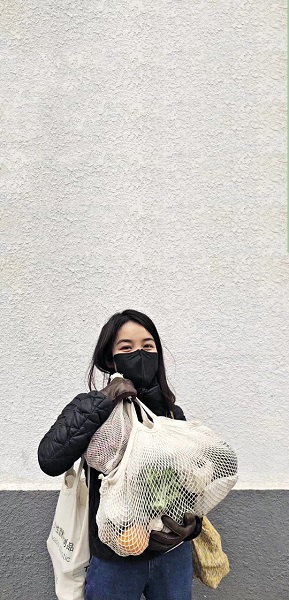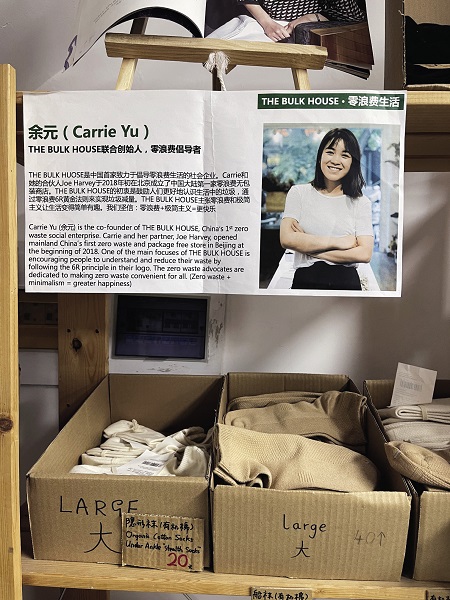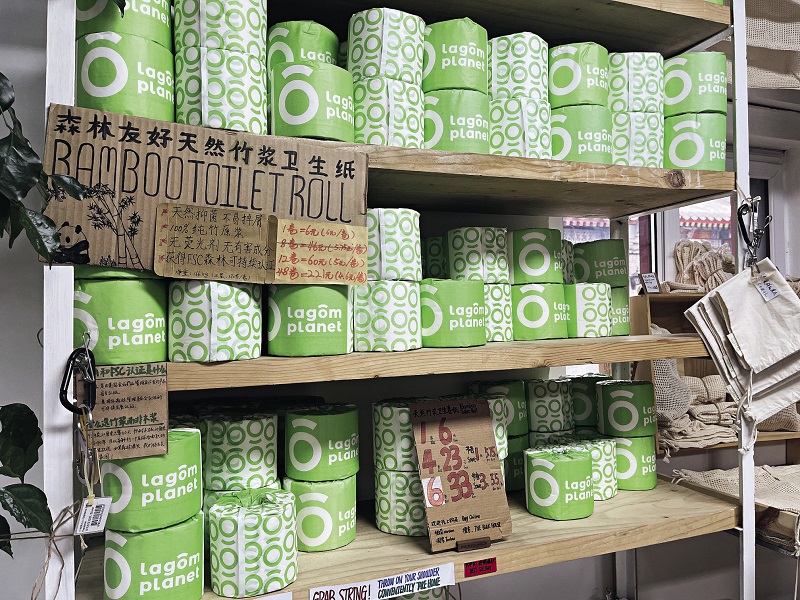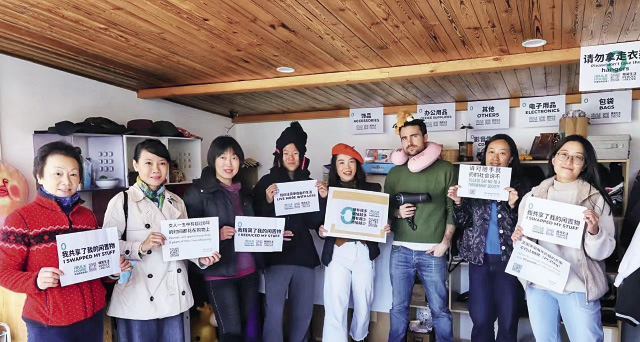Are you aware of how many disposable plastic products you use and ditch a year? It may take a while to calculate. But for Yu Yuan, the answer is definite – “zero.”

Reusable cotton mesh grocery bags are what Yu Yuan uses every day to buy vegetables and fruits.
In the morning, Yu Yuan gets up in her bedroom where there are only a bed, a closet, a laptop desk, and several potted plants. It takes her only seconds to figure out what to wear for the day since her wardrobe consists of no more than 50 items. She quickly gets herself dressed before starting a brand new day.
Yu rents a small place in downtown Beijing’s Beiluoguxiang Hutong. She keeps her home uncluttered, and the place seems brighter and bigger as a result. Everything in her home has a story. The white waffle weave blanket on the sheets was bought at a secondhand goods market she and her boyfriend organized last October. The wooden wash basin stand in the bathroom was found in a garbage can in the alley.
When cooking at home, Yu only cooks the amount of food she needs. Kitchen waste, such as fruit peels and vegetable roots, will be put in the refrigerator first before finally going to a compost bin on the balcony. After one month or two, they will become natural composts — a source of nutrients for her plants.
Yu’s motto is “making the most of everything.” But she admits that her present eco-friendly lifestyle has been made possible in an evolving manner. Even now she still reminds herself of being vigilant against excessive shopping, not letting external objects and information invade her personal space and time.

Organic cotton socks on display for sale at The Bulk House.
Dealing with Anxiety
In her early 20s, Yu used to indulge in shopping. Back then, she was working in a multinational company and earned a handsome income. She frequently visited shopping malls, and would buy a lot of clothes in fashion every month. But gradually, she found that the happiness material satisfaction brought her was only temporary, and most of her consumption demands were actually “created” by the sellers. Her time was wasted in constant buying and hoarding, and her living space became more and more crowded. She started to feel anxious.
The change came in 2016 when she moved to a new dwelling. The experience of moving nearly caused her health to break down. While packaging her belongings, Yu found hundreds of items that she barely used. This caused her to reflect over her materialistic lifestyle.
“I started out by not buying the same kind of stuff I already had and giving away unwanted clothes to friends. After my place was clear of clutter, I felt more relaxed and freer,” Yu said. More importantly, her cost of living was much lower, and she was much happier.
The great inner joy propelled her to make greater changes. Inspired by many environmentalists at home and abroad, Yu tried to do more. She began to leave her home every day fully prepared: have a reusable cup, bag, and everyday use items in her handbag. Yu said that she has not bought bottled water for nearly six years, and refuses to use disposable plastic products. For every other need, her first choice was to find reusable items instead of disposable ones.
“I remember when I first went to the food market and refused plastic bags from greengrocers, people were a little surprised. They were wondering how I was going to carry vegetables and other food home without plastic bags. Then slowly, seeing the mesh bags or cloth bags I carried around, more and more people understood that I did not want to create any plastic waste. They are appreciative and supportive.”
During the process, Yu’s concept of consumption has also changed. She still buys goods, but only what she really needs.
“My minimalist lifestyle has changed me in ways I could never have imagined,” Yu said. Now, the bathroom, kitchen, and bedroom in her home are very clean and tidy. “I used to have nearly 300 articles of clothing, but always hesitated when deciding what to wear. Now, all my clothes for all seasons can fit in a small wardrobe, and it takes only seconds to figure out what I will wear for the day. With fewer things, making choices becomes easier, which gives me more time.”

Forest-friendly bamboo pulp toilet paper is a specialty of The Bulk House.
Green Consumption
Yu is a young entrepreneur now. After benefitting emotionally from her eco-friendly living, she quit her job and dedicated herself to promoting the lifestyle to more people. She opened a store, The Bulk House, around her home — where she sells canvas bags, string bags, stainless steel tableware, wooden kitchenware, and other zero-waste products. In one corner of the store, there’s a small shelf of secondhand books which customers can take away. The bright green door of her store stands out in the alley.
The Bulk House promotes the 6R golden rule for a zero-waste lifestyle: refuse, reduce, reuse, repair, recycle, and rot. Yu believes that the top priority now is to deal with the overuse of plastics.
“Globally, less than 9 percent of plastic products are recycled, and the remaining are left on the earth, either in the air or in the food chain, or in our bodies. We need to reduce the use of plastics at the very fundamental level, and look for alternatives,” Yu said.
The Bulk House translates the zero-waste concept into action. For goods purchased on the store’s online platforms, Yu only chooses biodegradable cartons and corn-based water-soluble paper tape for the package. The shipping boxes are recycled. She also shuns plastic foam or bags as stuffing in the boxes. Every parcel is 100 percent eco-friendly. The cost is increased, though in Yu’s view, “To make the most of the resources around is what really matters.”
During the COVID-19 pandemic, she launched an independent brand called Lagom Planet, which specializes in making forest-friendly bamboo pulp tissue, eco-friendly aromatherapy oils, and skincare products. The name “lagom” is a Swedish word roughly translated as “Not too little. Not too much. Just right.” Yu picked it up from a Swedish book.
“It has something in common with ‘the doctrine of the mean’ that we Chinese have believed in for thousands of years. This brand represents my attitude, which is to encourage everyone who cares about the environment to find the best solution that both works for them in their daily life and benefits nature.”
In Yu’s eyes, consumption promotes production, technological progress, and economic development. However, the pressing problems caused by excessive consumption cannot be ignored. “Irresponsible consumption habits are like a time bomb which could harm our health and the earth at any time,” she said.
Yu believes that consumers have the right to require producers to make eco-friendly goods and use recyclable packaging. “Every choice we make as a consumer is a voice for building a green planet.”

Yu Yuan (fourth from right) with people who came together for the second-hand goods market “Reduce to Relive” held in her store on December 8, 2021.
Echoed by Many
In recent years, disillusioned with consumerism, many young people in China are embracing a minimalist lifestyle, striving to only use things that serve a purpose. On social media platforms, many weigh in on related topics.
On Douban, a Reddit-like online community in China where users join or create new groups to discuss books, movies, music, and lifestyle among other things, the “minimalist group” is very active and boasts 367,000 members. They advocate a lifestyle in which people only buy things that are absolutely necessary, and make the best use of the purchases. As urbanites feel increasingly stressed out, many have come to realize that excessive materials cannot do much to ease their inner anxiety in a busy life.
Yu often participates in such discussions online and shares her experience. Last year, she organized several offline activities where visitors traded secondhand goods. She believes one’s garbage is likely to be another’s treasure. The events attracted passionate visitors of different age groups.
“Many of my friends started to reduce their garbage because of my story. They bring their own cloth bags and food containers when shopping, and make composts from kitchen waste. I believe a large number of people making small changes can make a big change.”
Now, Yu and her boyfriend produce only two cans of domestic waste, approximately 1,000 milliliters, a year. She has more ambitious goals. For the lipsticks sold in The Bulk House, Yu wants to make it possible for consumers to fill up the lip balm every time it is used up. But so far, she has not found suitable technical support for that. “There are still quite a few challenges to overcome,” she said.